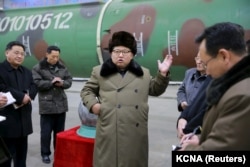The director of U.S. national intelligence says the ongoing U.S. push to persuade North Korea to give up its controversial nuclear program is, in his words, "probably a lost cause."
James Clapper delivered his assessment Tuesday in New York to the nonpartisan, independent Council on Foreign Relations. "They are not going to do that," he said of North Korea's leadership. "That [nuclear program] is their ticket to survival."
Instead, he said, the best that Western governments and their East Asian allies can hope for are negotiations with Pyongyang leading to a cap on its nuclear capabilities.
WATCH: James Clapper Discusses North Korean Nuclear Capability
Clapper described North Korea's reclusive leadership as "under siege" and "very paranoid."
"So the notion of giving up their nuclear capability, whatever [that] is, is a nonstarter for them," he added.
Jeffrey Lewis, Director of the East Asia Nonproliferation Program at the Middlebury Institute of International Studies at Monterrey agrees with Clapper's assessment.
"I think the DPRK is unlikely to give up the bomb. We're now in the phase of trying to limit their nuclear and missile programs," Lewis told VOA.
Lewis says the Director of National Intelligence should avoid policy talk such as "lost cause" and just stick to assessments when it comes to the rogue nation.
"It's fine to say that the DPRK places a high value on its nuclear forces, another to comment on the goal of our policies," Lewis noted. "This line is blurry, to be sure, and it is easy to misspeak. But he may also have a policy agenda."
For more than a decade, the U.S. administration and the vast majority of world governments have consistently demanded that North Korea denuclearize the Korean Peninsula. However, Western leaders have yet to devise a plan that would either compel the North to cooperate or create incentives for it to do so.
Talks sponsored by China between a six-nation panel and Pyongyang, aimed at finding common ground, have been stalled since the North withdrew from negotiations in 2009, three years after announcing its first nuclear test.
Washington has since said the resumption of the six-party talks would require the government of Kim Jong Un to commit once again to halting its nuclear tests and scrapping its nuclear development program — a stance the Obama administration reaffirmed Tuesday.
"We want to continue to see a verifiable denuclearization of the peninsula," State Department spokesman John Kirby said. "We want to see a return to the six-party talks process, and that means we need to see the North show a willingness" to do so.
Pyongyang has so far rejected Western overtures and continues to resist world leaders' attempts to bring it into compliance with a string of United Nations resolutions. It conducted two underground nuclear blasts this year, along with nearly two dozen missile tests, and shows no public sign of willingness to rein in its nuclear ambitions.
State Department correspondent Steve Herman contributed to this report








